If I were to quiz you right now in terms of how you know ‘Tagalog’, do you think you have enough Filipino words in your vocabulary?
Visiting a new country is an exciting adventure. Aside from seeing the beautiful sceneries of the place, travelers will also get the chance to learn about its people, its culture and everything about the country.
Isn’t that exciting?
For sure, you will agree on that. Although it is fun to learn new things while traveling, one challenging aspect is communication.
Think about this for a moment.
You arrived in a new place and you do not know their language. There is a need for you to ask for directions but you don’t even know how to start the conversation. Isn’t that hard?
That is why you need to study the country’s language before you get there. This way, you are prepared to start simple conversations and you will get your questions answered by the locals.
But that’s not all.
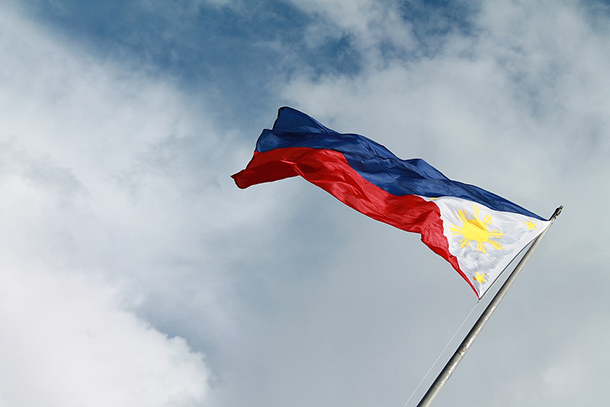
You will gain friends! Did you know that communicating with other people using their local language makes them feel special?
It gives them the impression that you are interested in them and you are making an effort to reach out to them.
For sure, you will also feel good that you could speak to others using a new language that you have learned.
So if you are in the Philippines, you have to learn to speak Filipino which is the main dialect in Metro Manila. Although the country uses various languages in different islands, everyone knows how to speak Filipino. Hence, this is the best language to learn.
But how can you do that?
We are going to provide an easy guide on how you can speak Filipino or Tagalog. This list will give you the basic Filipino words that are commonly used in communicating.
Table of Contents
Pronouncing Tagalog
It is easy to pronounce Tagalog or Filipino words since they are just pronounced in the same way as they are spelled. One vowel represents one syllable. For instance the word “maganda” (meaning beautiful) is pronounced as “ma-gan-da.”
The Filipino vowel is also comprised of A, E, I, O and U, just like the English alphabet. But it is pronounced differently. Here’s how:
A – Short “A” sound. Example: “bag” or “rat”
E – Short “E” sound. Example: “net” or “pen”
I – Long “ee” sound. Example: “feet” or “need”
O – The “au” sound. Example: “haunt” or “launch”
U – Long “oo” sound. Example: “pool” or “scoop”
Starting a Conversation

Now that you know how to pronounce Filipino or Tagalog vowels, it would be easy for you to learn the language.
When speaking to elders or to people that you have just met, it is good to add “po” in your sentences which signifies formality and respect. This is also applicable when answering elders. You can say “opo” which means “yes.” It is a more respectful way of saying “oo.”
In Filipino culture, elders are highly respected. That is why it is wise to use “po” and “opo” when speaking to them.
So if you are now ready to talk to someone, you can start by asking them if they speak English. This way, they will be aware that you only know a few Tagalog or Filipino words. Hence, they can adjust the way the speak so you can understand them.
To start a conversation, you can say:
Do you know how to speak English? – Marunong po ba kayong magsalita ng Inggles?
I don’t know how to speak Tagalog. – Hindi po ako marunong magsalita ng Tagalog.
You can also introduce yourself and ask the name of the person you are talking to:
My name is … – Ang pangalan ko ay…
What is your name? – Anong pangalan mo? (informal) / Ano po ang pangalan ninyo? (formal)
Where do you live? – Saan ka nakatira?
I’m from …- Ako ay taga-…/ Ako ay galing sa …
How old are you?- Ilang taon ka na?
Greetings and Pleasantries

Filipinos are friendly people. They greet anyone they meet on the street. It is important that you will learn to greet others too. You can do that by saying:
How are you? / Hi. / Hello. – Kumusta? / Kumusta ka? / Kumusta kayo? (when referring to two or more people)I’m fine – Mabuti
Beautiful day – Magandang araw
Good morning – Magandang umaga
Good afternoon – Magandang hapon
Good evening – Maganding gabi
Thank you – Salamat po
You’re welcome – Walang anuman
Happy birthday! Or Happy Wishes! – Maligayang Kaarawan! or Maligayang Bati!
Happy new year! – Maligayang Bagong Taon!
Merry Christmas! – Maligayang Pasko!
Basic Questions

You will get answers to your questions easily if you learn how to ask simple questions in Tagalog. Here are some basic questions with Filipino words that you need to learn when traveling in the Philippines:
What? – Ano?
When? – Kailan?
Where? – Saan?
Why? – Bakit?
How? – Paano?
What is this? – Ano po ito?
How much? – Magkano?
Do you have _______? – Mayroon ka bang _____?
Important Filipino Words and Phrases
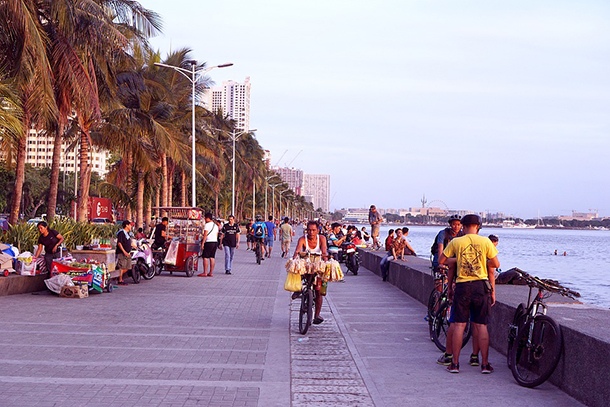
Aside from asking questions, there are also some phrases that you need to learn in order to communicate with the Filipino people. Here are some Filipino words that you may need to know:
Sorry / Excuse me – Pasensya na po.
May I bother you for a moment? – Maaari po ba kayong maabala sandali?
Can you please help me? – Maaari n’yo po ba akong tulungan?
Help! – Tulong!
Let’s go. – Tara na / Halika na.(to leave)
I am leaving now- Aalis na ako.
Wait a moment./ Just a moment./ Wait./ Hold on a second.- Sandali lang.
I don’t know.- Hindi ko alam. / Ewan ko.
Later.- Mamaya.
This is delicious.- Sarap nito.
Take care.- Ingat ka.
I don’t want. or I don’t like. or I don’t want to. – Ayaw ko or Ayoko.
I like this. or I want this. – Gusto ko ito.
Breakfast – Almusal
Lunch – Pananghalian
Dinner – Hapunan
Afternoon snack – Merienda
Getting Around

These Filipino words would be useful if you are asking for directions and if you are going to places.
Can you take (drive) me to…? – Pwede nyo po akong dalhin sa…?
I’m lost – Nawawala po ako.
I’m looking for… – Hinahanap ko po ang… (a place)
I’m looking for… – Hinahanap ko po si… (a person)
I’m looking for… – Naghahanap po ako ng… (a thing)
Can you show me on a map how to get there? – Maaari bang ipakita nyo sa mapa paano po pumunta doon?
Where is…? – Nasaan po ba ang…?
Left – Kaliwa
Please turn left – Kumaliwa po kayo.
Right – Kanan
Please turn right – Kumanan po kayo.
Straight ahead – Diretso
Go straight ahead – Diretso lang po.
In front – Sa harap
Behind – Sa likod
Upstairs/Above – Sa taas
Downstairs/Below – Sa baba
When is…? – Kailan po ang…?
How much is the fare? – Magkano ang pamasahe?
Where are you going? – Saan ka pupunta?
What time is the departure? – Anong oras ang alis?
What time is the arrival? – Anong oras ang dating?
What time is it? – Anong oras na?
Buying

Of course, there will be times when you need to purchase some items. Make sure that you get the right items by learning these Filipino words:
Too expensive – Masyadong mahal. / Ang mahal naman.
May I ask for a bargain? / Please lower the price. – Pahingi naman po ng tawad. / Tawad naman po. / Babaan nyo naman po ang presyo.
Keep the change. – Sa inyo nalang po ang sukli.
You haven’t given me enough change. – Kulang po ang sukli.
You’ve given me too much change. – Sobra po ang sukli.
Do you have this in a different color? – Mayroon ba kayong ibang kulay?(Then specify color in English)
Do you have this in a different size? – May ibang size ba kayo nito? (Then specify size in English)
I would like to buy – Gusto kong bilin
A little – Konti lang
A lot – Madami
All – Lahat
Bigger – Mas malaki
Smaller – Mas maliit
Time

Now here are the Filipino words that will help you tell time.
Day – Araw
Night – Gabi
Dawn or Early Morning – Madaling araw
Morning – Umaga (6:00 a.m. to 11:59 a.m.)
Noon – Tanghali or Mid-day (12:00 a.m.)
Afternoon – Hapon (12:01 p.m. to 5:59 p.m.)
Later – Mamaya
Tomorrow – Bukas
Earlier / A while ago – Kanina
Earlier this morning – Kaninang umaga
Earlier this afternoon – Kaninang hapon
Now – Ngayon
Later this afternoon – Mamayang hapon
Later tonight – Mamayang gabi
Yesterday – Kahapon (can also mean “yesterday afternoon”)
Last night – Kagabi
Last week – Noong nakaraang linggo
This week – Ngayong linggo
Next week – Sa susunod na linggo
Last month – Noong nakaraang buwan
This month – Ngayong buwan
Next month – Sa susunod na buwan
Last year – Noong nakaraang taon
This year – Ngayong taon
Next year – Sa susunod na taon
1:00 AM – Ala una ng umaga
1:30 AM – Ala una i medya ng umaga
7:30 AM – Ala siyete i medya ng umaga
2:00 PM – Alas dos ng hapon
12:00 Noon – Alas dose ng tanghali
3:00 PM – Alas tres ng hapon
6:00 PM – Ala sais ng gabi
Numbers and Currency

It is also important that you know how to count in Filipino. You will be buying items in the Philippines so learn how to count your money using the local language.
One – Isa – Isang piso
Two – Dalawa – Dalawang piso
Three – Tatlo – Tatlung piso
Four – Apat – Apat na piso
Five – Lima – Limang piso
Six – Anim – Anim na piso
Seven – Pito – Pitung piso
Eight – Walo – Walung piso
Nine – Siyam – Siyam na piso
Ten – Sampo / Diyes – Sampung piso
Twenty – Dalawampo – Dalawampung piso
Thirty – Tatlumpo – Taltlumpung piso
Forty – Apatnapo – Apatnapung piso
Fifty – Limampo – Limampung piso
Sixty – Animnapo – Animnapung piso
Seventy – Pitumpo – Pitumpung piso
Eighty – Walumpo – Walumpung piso
Ninety – Siyamnapu – Siyamnapung piso
One Hundred – Isang Daan – Isang daang piso
Five Hundred – Limang Daan – Limang daang piso
One Thousand – Isang Libo – Isang libung piso
Days of the Week and Months
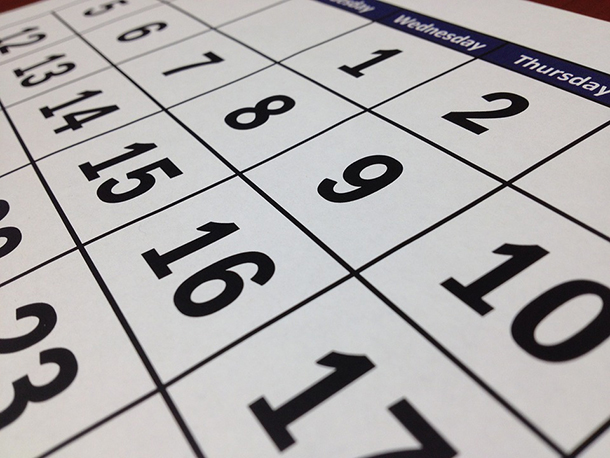
Now let us learn how to say the days of the weeks and the months in Tagalog.
Days of the Week
Monday – Lunes
Tuesday – Martes
Wednesday – Miyerkules
Thursday – Huwebes
Friday – Biyernes
Saturday – Sabado
Sunday – Linggo
Months
January – Enero
February – Pebrero
March – Marso
April – Abril
May – Mayo
June – Hunyo
July – Hulyo
August – Agosto
September – Septiyembre
October – Oktobre
November – Nobiyembre
December – Disyembre
Well, learning Tagalog or Filipino isn’t that hard at all! Don’t forget to bookmark this guide! You can review it whenever you forgot something while talking to someone in the Philippines.
If you can, practice the Filipino words above before you visit our beautiful country. See to it that you have mastered/ familiarized them in terms of usage and pronunciation.
Don’t worry if there are times that you cannot find the right words to say. Filipinos will surely be happy to help you!
Like this post? Pin it!
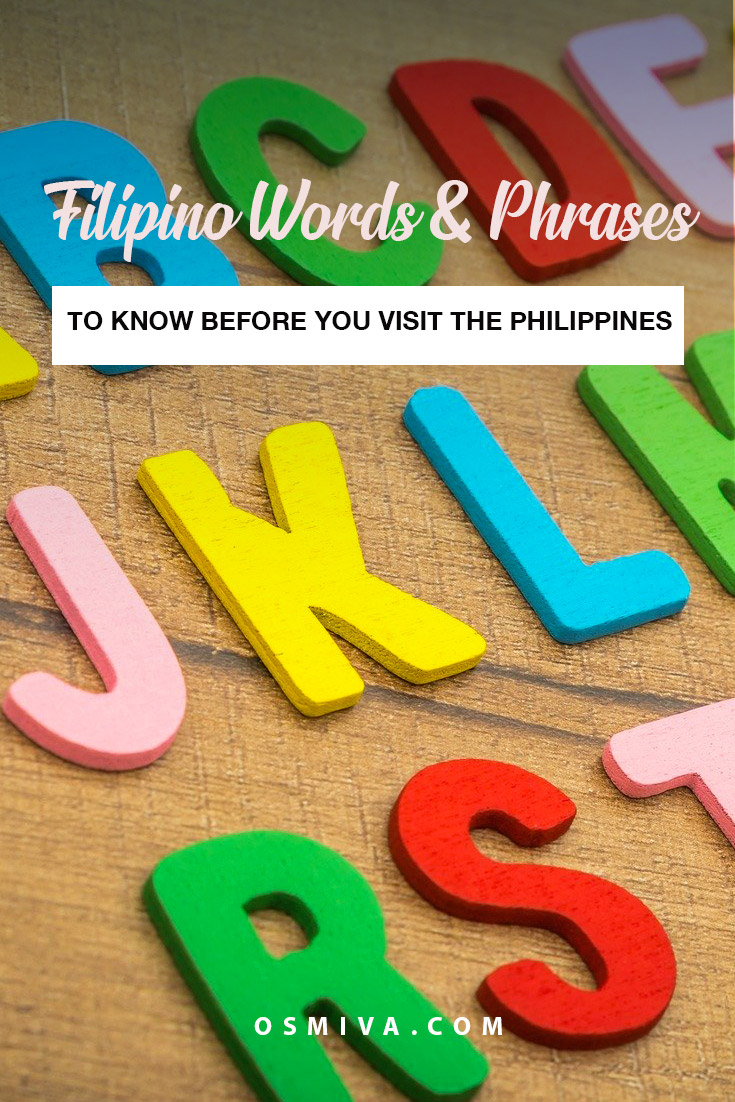 |
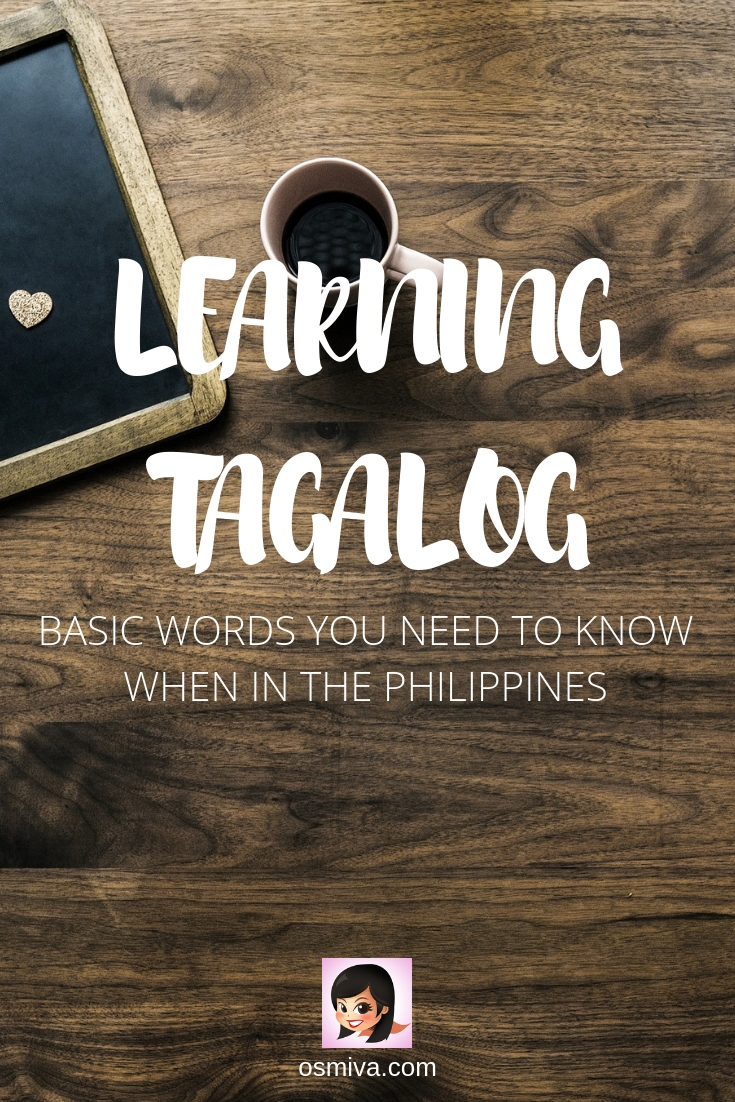 |


Wow this is awesome! You put so much work and effort into learning the Filipino language and communicating with the locals! I love that! And you are so right! Even being able to say Hello and Thank You in language of the country you are travelling will make such a difference! I have encountered that numerous times and it always puts a smile on peoples faces!
Thank you Jacqueline! Learning a few local words is really a great thing to do when you’re on travel. Makes local appreciate the effort of learning one or two words. 😉
What a great guide to all of the essentials! Definitely saving this for when I make it to the Philippines 😉 and thank you so much for including the vowel pronunciation guide at the beginning! If I was muddling through on my own, I definitely would have got those mixed up (“I” as “ee” in particular). Thank you for sharing!!
Glad to have helped you Sheree! 🙂
Oh I absolutely love this! I am such a lover of languages – having already studied 5 of them extensively. I will be visiting the Philippines in a few weeks and I can’t wait to use some of this. Thanks for sharing 🙂
Ohhh… Great to hear that!. I’m sure you’ll love it here! You’re most welcome! 🙂
That’s awesome. Such an informative post! 🙂
Glad you liked it.. 😀
Always fun to learn new languages and tips! Thanks for sharing!
So true! 🙂
Great post! Super helpful!
Thank you! 😀
What a great guide. Thank you.
You’re welcome Karen! 🙂
I wish I had seen this post before I visited last year. It would have been super helpful. I usually do learn a few words as if nothing else, it can be really entertaining and break the ice with people from a different country.
It does!.. 🙂 Maybe next time when you return..
Thank you so much for all the time you spent putting all this together. It’s an amazing idea. I think learning a few words is a form of respect when travelling to a foreign country. It’s never easy, but I feel locals always appreciate it (and it also often makes them laugh…).
I am under the impression that the pronunciation of vowels is quite close to how we pronounce them in French. And I love languages where letters are pronounced in the same way as they are spelt. It’s soooo much easier. I mean, English and French are both ridiculous for that. I’ll save your post for when I’ll plan a trip to the Philippines. Thanks again!
I couldn’t agree more. Locals like it when foreigners speak two or more words in their native tongue! 🙂
It looks like the vowels are very similar to Italian and we also pretty much pronounce what we spell. I guess I could have good luck reading Tagalog out loud as an Italian speaker!!
I believe it will be more easier! 🙂
What a great an introduction to getting around in the Philippines! The weekdays and months are so similar to Spanish – are they pronounced the same way?
Super useful post! Thank you for sharing
More or less.. 🙂 Tagalog words are rooted from Spanish (we were colonized by the Spaniards long ago) thus the similarities…
Definitely Bookmarking this for when I travel to the Philippines! This will save me from conversing with my horrible charades!
I always worry about travelling to “Asian” countries cause their language isnt even close to a Romantic Language for me to cheat my way through but I do love how it is easy to say the words.
It is also so cool that you guys have formal add ons for elders. That just made my day reading that!
Thank you Eric..:)
That’s one thing I’m terrible at, is trying to learn the local language. I guess I just take for granted how lucky I am to speak English, which happens to be the standard one in most places! But you’re right, it goes a long way with the locals if you at least try.
Generally, a lot of Filipinos can speak English.. But it really pleases us if foreigners speak our language.. 😀
Awesome work here and I will def pin this for when I make it to the Philippines!Those are islands are calling me!
Wow, this is a ready reference for anyone visiting the Philippines. I love the way you have categorized the commonly used words, making it easier to remember similar sounding words like words related to time or greetings. Thank you.
You’re welcome.. 🙂 Glad you find it useful!
Great post! I always try to learn basic words and phrases in every country I go and I believe that’s the right travelling attitude 🙂
Thank you Gerry! 🙂
Great post! So comprehensive and informative 🙂 My boyfriend thinks that he would never be able to learn the Filipino language and to be honest, I am not sure if I am a patient teacher when it comes to that. This blog would be very helpful for him and others who are planning to visit our country. Thanks for sharing! 🙂
Aww.. That’d be awesome! I hope he’ll learn a few words through this post.. 🙂
This is such an informative and comprehensive guide! I will definitely use this when traveling to the Philippines
Wow! I love learning new languages! Love the way you’ve written such an exhaustive and informative guide. I too believe that learning basic and essential words of a language of the country you are visiting makes things easier and then you get to learn something new. Learning new things every day is the essence of life. Thank you so much for sharing this 🙂 Keep up the good work!
This is such a great resource for people travelling to the Philippines. Thanks for writing it.
Lovely blog, I agree, every traveler should learn some local words when they visit a different country. I love learning different languages.
I have been to the Philippines 6 years ago and we did learn a few words but I have totally forgotten them all! What ashame because some of my closest friends are from Philippines although they use different dialect. I will make them a surprise and learn some of the words you have provided!
Salamat po for the awesome tutorial on Tagalog lesson! The Philippines is one of those destinations I really hope to get to in the next two years so this tutorial will really come in handy. The language seems like it has a major Spanish influence and a lot of the words seem like Spanish words that are simply spelled differently. You’ve really covered most basic aspects of the language which is awesome! Thanks for sharing!
Aww… Walang anuman Jose Harvey!.. I’m glad you liked it! Cheers!
I used to date a Filipino guy when I was younger and I always liked the sound of Tagalog. Seems a bit easier to pick up than other South East Asian languages too. I remember him saying to me “maganda ka!” haha 🙂
Awww… That’s so cute! 😀
Thanks for putting this together! I visited the Philippines last year and the local communities were the most lovely people, I felt so bad not being able to converse even a little in their language. My aunt in Australia is actually from the Philippines, so I’m going to work on my Tagalog pronounciations and try to have a couple of conversations with her. Noted to add a po into my sentences to show respect.
This is a very helpful guide, I might actually print it out to take with me on my next trip 🙂
That’s great to hear Megan.. 🙂 I’m sure your aunt will love it! 😀
This is such a comprehensive post for an upcoming trip to the Philippines! It could be its very own guide book 🙂
This is super useful to know. As a traveler I love to be able to speak at least a few words to show that I’m at least trying my best. It is very respectful to the native people and makes you look less like just a transient or careless tourist. I’m glad you mention how to say things formally and respectfully to elders. I think this makes a huge difference in how people perceive you and can really help you if you are in need!
thank you so much for useful info!
This is a really awesome and practical post, Marvi. I believe that everyone going to the Philippines should read your post and learn the basic words. 😉
Thank you, Agnes! 🙂
It is always good and an added advantag e to know the local language as some people don’t treat foreigners properly
Well, yes.. If you look at it that way.. It’s great to understand a few words not to feel left out.. 🙂
I love this! I think it’s so important to know at least a few words in the language of whatever country you’re visiting – like please and thank you, if nothing else! This is a great guide!
Glad you liked it! 🙂
This is such an incredible resource! Thank you for all the hard work you put into this. Language and communication always make me most nervous about traveling in new places, especially since we tend to like to explore outside of touristy areas. 100% keeping this for when we make it to the Philippines!!
This is a really good post! There should be one of these for every country bookmarked on all of our computers, so when ever we travel we could study something before the trip. It is such a good thing, and polite too, to learn some local language.
I do agree with you, that while visiting a country it is always beneficial to learn few local words, it help you bond with them. But living in Dubai, and have so many Filipina colleague I automatically got to learn few words from them :). We always love to exchange teaching each other few words.
Wow…I don’t know any language other than English and my native but I really love to try and use small phrases, learn some words and talk in the native language where ever I go. Your translation is really very useful particularly for travelers as you have included here all the useful phrases one normally needs while traveling. I am going to bookmark it and refer in future.
Wow, what a wealth of information! I agree that learning even the basics of the language of the country you’re visiting can go a really long way in enhancing your experience. I’ll use this post as my reference when i visit Philippines 🙂
This is going to make life of everyone who are visiting Philippines. I usually use Google translate to communicate with the locals. But your translation is way more easier to understand and very helpful. Thanks for the share.
Commendable! Thanks for sharing this awesome post! Even I learnt few words and phrases for my trip to Italy this year. It definitely felt good. 🙂